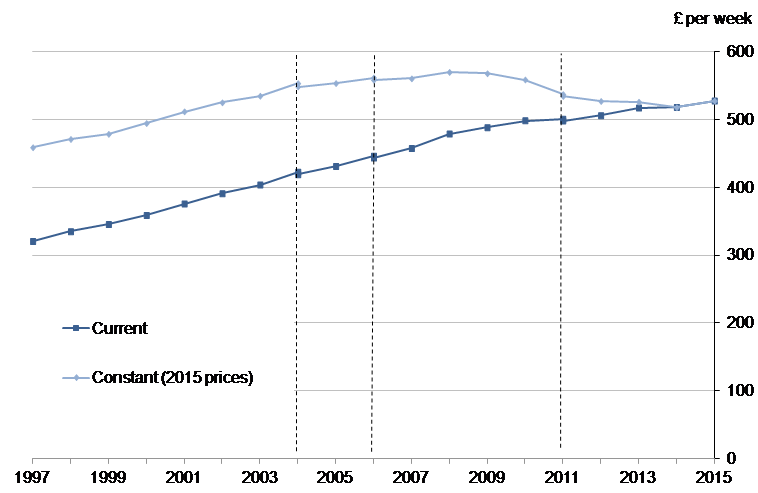Source: UK Office for National Statistics, Annual Survey of Hours and Earnings
The impact of EU migration on those on low incomes
Just looking at average wages is a simplistic approach which does not control for other features of the UK economy which might have been changing over the last two decades [2]. Fortunately, there are a number of more sophisticated empirical studies of the effects of migration which use survey or administrative data to measure the impacts in more detail. Most of these studies focus on the overall effects of immigration (rather than just the EU) but as migration from other EU countries is a large component of overall immigration over the last 15 years, the results are still relevant.
Recent research suggests that increased immigration has had no measurable impact on average wages in the UK even when controlling for other factors [3]. At the bottom of the wage distribution, there is also no obvious impact on the wages of low-paid workers born in the UK at the bottom of the distribution. However there does seem to be a negative impact on the wages of low-paid workers born outside the UK, i.e. earlier waves of migrant workers, although this is mitigated by the National Minimum Wage, which has set a floor for wages since its introduction in 1999 . Evidence also suggests that increased immigration is associated with increased wages at the top of the wage distribution [5].
The impact of EU membership on the UK’s overall economic performance
In the long run, the UK’s overall economic performance is a key determinant of wage growth. Therefore, in considering the impact of the UK’s membership on wages, it is important to consider the impact of EU membership on the country’s economic performance. Most (although not all) economists believe that the UK has benefited from membership of the EU in terms of increased opportunities for trade and lower barriers to export markets, and inward migration from highly talented European workers. By the same token, most economists believe that ‘Brexit’ would be bad for the UK’s economic prospects. In the Financial Times‘s annual poll of more than 100 leading economic thinkers, around three-quarters of respondents thought leaving the EU would damage the country’s medium term outlook, while less than one in ten respondents thought the UK would benefit from leaving [6].
The most important negative predicted consequences if Britain leaves the EU are reduced inward investment into the UK economy and reduced inward migration of talented workers. Reduced inward investment would almost certainly damage UK productivity (and hence wage levels) [7] . Reduced inward migration could lead to skill shortages which might increase wages for certain occupations in the short run but would also be likely to have a negative impact on productivity through impairing business efficiency [8]. There is also empirical evidence that increased migration increases innovation activity in the country migrated to (e.g. patent applications) [9] , suggesting that reduced immigration could reduce innovation and hence growth. This would also be bad for UK productivity (and hence for wages).
Conclusion
This article has shown that there is no evidence that increased immigration from other EU countries has had a negative impact on average wages in the UK, although there is some evidence of a small negative impact for low-earning migrant workers already present in the UK. In this regard, increasing the National Minimum Wage (now called the National Living Wage for workers aged 25 and over) is a good thing. Meanwhile, the overall consensus among economists is that the UK benefits substantially from EU membership in terms of improved economic performance and greater innovation. To the extent that ‘Brexit’ harmed the economy, this would be likely to cause a negative impact on wages.
Howard Reed is Director of Landman Economics
Footnotes (for hyperlinks see article in pdf of Remain for Change at p.14-17)
[1] The A8 countries are the Czech Republic, Estonia, Hungary, Latvia, Lithuania, Poland, Slovakia and Slovenia. Cyprus and Malta also joined the EU in 2004.
[2] Note that in addition to increased immigration there have been many other changes in the UK labour market in recent decades which may have affected wages – in particular reduced trade union density, lower coverage of collective bargaining agreements, legislative changes (such as the National Minimum Wage) and changes to the industrial and occupational structure of the UK. For more on long-term trends in wages see Howard Reed and Stewart Lansley, How To Boost The Wage Share, TUC Touchstone Pamphlet No 13, London: Trades Union Congress.
[3] See Swati Dhingra, Gianmarco Ottaviano, John Van Reenen and Jonathan Wadsworth, “Brexit and the impact of immigration on the UK”, LSE Centre for Economic Performance, CEP Brexit Analysis No 5, May 2016, in particular Figure 9.
[4] For more detail on the impact of migration on wages at the bottom of the wage distribution see Swati Dhingra, Gianmarco Ottaviano, John Van Reenen and Jonathan Wadsworth, “Brexit and the impact of immigration on the UK”, LSE Centre for Economic Performance, CEP Brexit Analysis No 5, May 2016 (in particular Figure 11).
[5] See Dr Martin Ruhs and Dr Carlos Vargas-Silva, “The Labour Market Effects of Immigration”, Briefing Paper, Migration Observatory at the University of Oxford, May 2015.
[6] Chris Giles and Emily Cadman, “Economists’ forecasts: Brexit would damage growth”, Financial Times, 3 January 2016. [paywalled]
[7] While the precise relationship between wages and productivity is complex, most economists agree that in the long run wage increases are paid for out of productivity increases, and hence a reduction in business productivity is likely to reduce wages.
[8] See for example, J Portes (2015), “Immigration and the Productivity Challenge”, written evidence to UK Parliamentary Select Committee on Home Affairs,
[9] For more detailed evidence on this issue see the briefing paper “What do we know about migration? Informing the debate” by the Centre for Research and Analysis of Migration (CReAM) at University College London.





